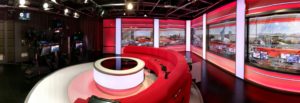Welcome to Media City
The next morning, we departed for Manchester, a.k.a. Media City. Manchester is the current home of the BBC which is located right next to Salford University. The university is located in Media City, which is one of the biggest media hubs in Europe. The University is full of different TV and radio studios where students can work on news, broadcast, radio shows, and other media related projects. Dr. Annabelle Waller, Associate Dean International, School of Arts and Media, also informed us that there were opportunities for professionals in the media to come in and use the space while working with students.

There is also a creative workspace where physical and digital collide. Students can use a 3D printer along with other materials and equipment. Say a student is developing a video game and they need a character, using the materials available in the creative space they can create a figure, scan it, and add it into the game digitally.
The Future of Immersive Media
After taking a quick tour of the University, we went into a classroom and spoke with Dr. Annabelle Waller about the future of immersive media with the rise of technology and virtual reality. The biggest question surrounding the topic of virtual reality is whether or not it is the future of our media. Will VR become something mainstream, or is it merely just cool tech that won’t make it into the average household.
Working in Children’s Television
Next, we talked with James Probert, BBC Assistant Producer of Blue Peter. James spoke to us about his experience working in children’s television and all of the different opportunities he had. I found James’ story very inspiring because he didn’t initially start off in media, but through some connections and hard work, he was able to rise to the position he now has.
BBC
The BBC or British Broadcasting Corporation is a British public service broadcaster and the world’s oldest national broadcasting organization. They were initially based in London but ended up moving in 2012 to the space that they are in now. The BBC is funded by the people through an annual television license fee which is charged to all British households. Since the station is paid for by the people, the BBC does its best with remaining neutral when reporting.
 BBC Radio has a total of 7 national radio stations and 39 local stations. They reach over 600 million people across Europe alone. The television stations also very impressive and are incredibly versatile. Many of the television sets are actually reasonably small, and through the use of lighting and green screens, they are able to make space look bigger and different for each production.
BBC Radio has a total of 7 national radio stations and 39 local stations. They reach over 600 million people across Europe alone. The television stations also very impressive and are incredibly versatile. Many of the television sets are actually reasonably small, and through the use of lighting and green screens, they are able to make space look bigger and different for each production.